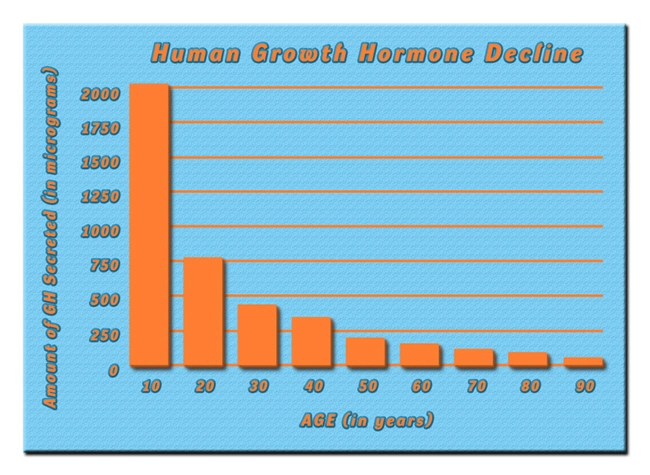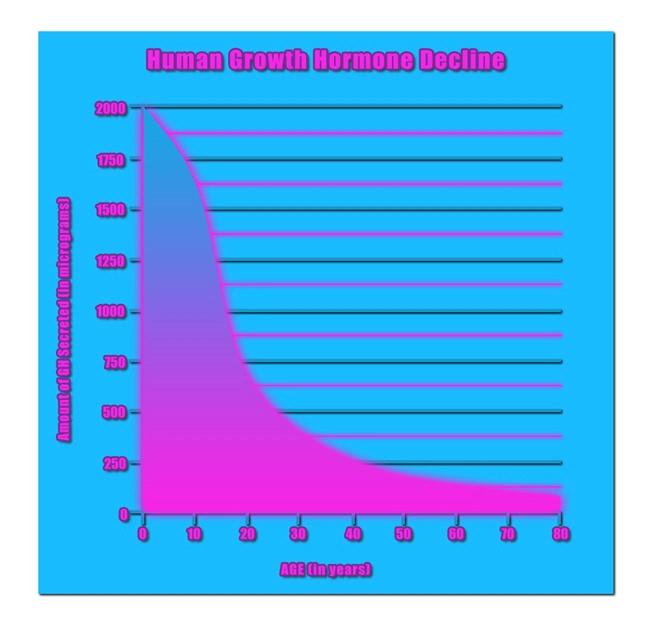
As we age, we experience a drop in Human Growth Hormone HGH) that causes several emerging developments that are unwanted. Two of the most obvious are an accumulation of fat and shrinkage of muscle. This unfortunate problem occurs even if our weight stays similar to our earlier years. In addition to looking pudgy, this inversion is also a severe risk to our continued good health.
If you've heard it once, you've listened to it seemingly a million times: muscle is heavier and denser than fat. And it's true.
Check out the difference between a muscular, physically fit 200-pound athlete compared to a 200-pound snack-food devouring couch potato. It's hard to believe they weigh the same. And what about your own experience?
If you are working out hard intending to lose weight, you are undoubtedly dismayed when stepping on the scale and seeing that you not only haven't lost weight...but you have incredibly gained a few pounds!
Body Mass Index (BMI) is the primary go-to formula to measure fitness by age and weight and is an excellent place to start.
Many people misunderstand the concept and consider it the holy grail when it comes to measuring health. However, it has its drawbacks. Before we proceed, let's understand the metrics behind BMI. The formula is simple:
BMI = 703 x Weight Height Squared
Example: You weigh 175 pounds and stand 5 feet, 10 inches tall. The calculation is as follows:
703 x 175=123,025 / 70 = 1,757.5 / 70= 25.1
The standard interpretation of this final number is as follows: Less than 18 = Underweight 18.5 to 25 = Healthy weight 25 to 30 = Slightly overweight 30-35 = Moderately obese 35-40 Severely obese Over 40 = Very severely obese. However, there is more to the story.
Because muscle is denser than fat, the more muscle mass you pack means, the less accurate the BMI will be at assessing your health based on your weight. BMI is an average measurement, and therefore would rate a competitive bodybuilder with a contest-level amount of body fat at 3-5% would be considered overweight!
Muscle mass is so critical. Another thing to consider is this: most body fat is invisible. The body contains fat internally, and fatty tissue separates your organs. Additionally, the body isn't designed to carry body fat efficiently.
Our ancestors rarely had the opportunity to build a lot of fat, not only due to their hunter-gatherer lifestyle and the cycles of feast and famine they were forced to endure. Body fat was an evolutionary benefit because it could keep people alive longer when times were lean.
But Then Came Fast Food at Every Street Corner
Today, we live in a period of unknown abundance that our ancestors never had the chance to experience, and thus, never adapted to continual comfort. This is why being overweight or obese is such a severe health hazard.
When we consider our evolutionary past, it is easy to conclude that we have historically been in far more excellent physical condition and healthier than we are now.
To catch our prey and fend off predators and enemies, we naturally stayed active and fit. Our early ancestors also tended to be much more nomadic, which  means that they were used to walking long distances every day.
means that they were used to walking long distances every day.
Today, most people can make it through the day with very little physical activity, which causes us to be much weaker and less fit than our ancestors unless we take the time to work out, exercise, and build our muscles.
So, what gives? How in the world could this be? Just as some insist that "a calorie is a calorie, regardless of its source" (wrong, but that is an entirely different topic), many say that "a pound is a pound, and it all weighs the same."
This is technically correct, which means that it's right...but it's wrong at the same time. Here's why.
The Density Difference
As just mentioned, a pound is a pound. This statement holds true for everything. A pound of water weighs the same as a one-pound bag of fruit. But when it comes to the muscle vs. fat comparison, the critical thing to remember is that muscle is far denser than fat (approximately 18%). Additionally, muscle takes up less space than fat.
The effect of this is that when measured, an inch of muscle will weigh more than an inch of fat. When you are working out correctly and pumping severe iron, your weight may increase. But for most of us, the mirror is more important than the scales...far, far more critical.
Think about this: if your waistline measures 32 inches, what is the difference between weighing 165 pounds or 195 pounds? The takeaway is to look at several different fitness metrics, not just a number on a scale. Check out these two pictures... 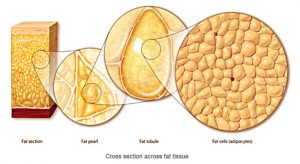
By taking a good look, you can easily see that a cross-section of muscle tissue is denser, while a cross-section of fat mass is less dense.
This means that the muscle will take up far less space in your body and will be smoother under your skin and between your organs than the same fat weight.
When adding up the inches and the pounds, the results can be pretty significant, to put it mildly. Most of us would rather be carrying around five pounds of smooth, dense, healthy muscle tissue than five pounds of gelatinous, ugly, blubbery fat.
Let's take a look at the difference that replacing fat with muscle can make.
The Benefits of Increased Muscle Mass
- Blowtorch disease-producing fat
- Skyrocket your strength, energy, power, and balance
- Make you a better athlete, regardless of your sport
- Blast off your metabolism
- Lower your risk of injury
- Strengthen your immune system
- Give you greater capacity to respond in times of trauma and emergencies
- Control your blood sugar, increase your insulin sensitivity and lower your glycogen storage
- Feel better about yourself...like night and day!
- Increased metabolic efficiency
Increased Metabolic Efficiency
Of all of the above-listed benefits, the increase in metabolic efficiency deserves a closer look since it is so important. Each pound of fat that is taking up rent in your body equals 3,500 calories of inefficient energy.
To lose one pound, you need to make a calorie shortage of 3,500 calories in one of two ways: either eat 3,500 calories less over a period than your body needs or burn off 3,500 calories through exercise.
You can, of course, accomplish this at your own pace, and radical, drastic measures are not recommended just because they are hard to stay with. The key is to start a resistance training regime, both body weight exercise and weight-lifting, which will increase your muscle mass and replace your fat storage.
Also, short bursts of high-intensity interval training (HIIT) will also help. This means emphasizing sprints rather than long-distance, slow jogging. These two approaches will work wonders in helping you burn more calories when you are resting than the fat tissue will. Check out this image:
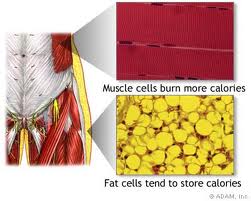 So, the key to burning more calories while you are relaxing is to make your metabolism more efficient, thus making your body a better fat-burning furnace. But stay realistic.
So, the key to burning more calories while you are relaxing is to make your metabolism more efficient, thus making your body a better fat-burning furnace. But stay realistic.
The muscle magazines are prone to hyperbole in many areas, and this one is no different.
For example, one of their standard measuring sticks is this: one pound of muscle can burn an additional 50 to 100 calories daily more than fat. If only this were true.
The reality is this: a recent study done by Claude Bouchard, an obesity researcher at the Pennington Biometric Research Center located in Baton Rouge, Louisiana, concluded that one pound of resting muscle burns approximately six calories per day, while a pound of fat burns about two calories per day.
Granted, six calories is a lot less than 50-100. But it is still three times the amount that fat burns. The name of the game here is patience. Those four extra calories burned daily will add up. Therefore, keep working out, eat healthily, and don't stress over the scale. More muscle = more calories burned...and that's exciting!
Weight-loss and Improved Insulin Sensitivity
Another benefit of increased muscle mass that was mentioned earlier is improved insulin sensitivity (IS). This is vital for one simple reason: When insulin sensitivity is not functioning as it should, losing weight and keeping it off becomes a much more challenging task.
When you're losing weight or lowering your body fat percentage, your insulin sensitivity increases, the same thing happens the more you work out. The conclusion? The leaner and lighter you become, the more powerful your IS levels will be.
Another critical topic is glycogen storage. The amount of glycogen you can store depends on the amount of your muscle mass and your level of intensity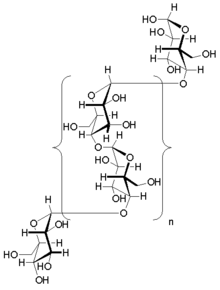 when training.
when training.
With proper nutrition and a reduction in carbohydrates, the body will use stored-up fat as a fuel source most of the day...and that's precisely what the doctor ordered.
Again, the keys are correct nutrition and the proper exercise routine. Also, one more reminder to stop focusing on the scales.
Don't forget that when you are building muscle and losing fat, you may not see your efforts reflected when you step on the scales. But your body composition will be changing much for the better. And this leads us to our next topic...
What is Body Composition, and Why is it Crucial?
Body Composition is a term used to describe the percentages of fat, bone, water, and muscle in the human body. This is important because, as was mentioned earlier, muscle tissue takes up less space in our bodies than fat tissue.
Therefore, body composition determines leanness, as much if not more than our actual weight.
Body composition is determined by measuring overall body fat levels by skin-fold caliper measurements, hydrostatic weighing, and bio-electrical impedance.
This gives you a close reading of how much your body is made up of fat and how much lean muscle mass you have.
If you have a higher percentage of fat compared to muscle, you will appear heavier than if that ratio is lower. This explains our example in the first paragraph of the difference between a muscular, physically fit 200-pound athlete compared to a 200-pound snack-food devouring couch potato.
More important than mere appearance is the health consequences of too much fat: high blood pressure, cardiovascular disease, and increased risk of diabetes.
This adds to the many reasons to lower body fat and replace it with increased muscle mass. Still another reason for not becoming obsessed with what the scale is telling us is this: the water balance in your body can cause your weight to fluctuate by several pounds a day.
This is why fighters "dry out" in the sauna and steam room...and then rehydrate immediately after the weigh-in. In fact, boxers, wrestlers, and mixed martial artists have been known to lose up to 20 pounds in a few days by this method, then pack it back on in less than 24 hours.
Competitive bodybuilders also have water manipulation down to a science. This may help in competitive sporting contests. But it has nothing...absolutely nothing to do with long-term health.
At the risk of sounding like "one-note-Johnny," it must be emphasized that there are several ways to measure your health and fitness progress, and the scales are only one of them...and not necessarily the most accurate metric.
Putting it All Together
Before you get going on your fitness program, it is essential to ascertain your current physical condition. This means determining your body weight, blood pressure, strength, body fat measurements, body circumference, and flexibility.
 Also, a picture of yourself can be beneficial. And don't forget to track your workout progress by writing down everything...your exercise routine, your nutrition, and how you are controlling your stress levels.
Also, a picture of yourself can be beneficial. And don't forget to track your workout progress by writing down everything...your exercise routine, your nutrition, and how you are controlling your stress levels.
More important, take a long-term view of your health and physical fitness. The best answer to the question of "when are you going to stop working out?" is "When are you going to stop brushing your teeth?".
This is a journey, and it won't be any more or less successful if you jump on the scales several times a day.
This bears repeating: the mantra "a pound is a pound" is both accurate and untrue. It's true in the sense that a pound of fat weighs the same as a pound of muscle.
But it is false in the meaning that muscle is far more dense than fat and consequently occupies less space in your body. If your motivation is waning, go back and re-read the benefits of increased muscle mass listed above.
Don't stop learning. There are several exciting new developments in the fields of nutrition, exercise, and supplements that promise to deliver excellent health on a far grander scale than anything that has been seen to date.
Finally, consider the incredible transformative ability of an HGH treatment regimen. Growth hormone is just the ticket to revitalize your metabolism, awaken those sleeping muscles, and show the excess lard around your midsection the door.
Enjoy the journey! A picture paints a thousand words, and there is no better way to close out this article than this:
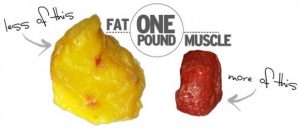
Reference
Does Muscle Weigh More Than Fat?
Contact Us Today For A Free Consultation
Dear Patient,
Once you have completing the above contact form, for security purposes and confirmation, please confirm your information by calling us.
Please call now: 1-800-380-5339.
Welcoming You To Our Clinic, Professor Tom Henderson.

- No Gym since COVID-19? No Problem! [Last Updated On: April 20th, 2023] [Originally Added On: January 12th, 2021]
- Growth Hormone and Fitness [Last Updated On: March 11th, 2024] [Originally Added On: October 12th, 2021]
- Growth Hormone and Creatine [Last Updated On: March 12th, 2024] [Originally Added On: October 12th, 2021]
- Growth Hormone boosts Metabolism! [Last Updated On: March 9th, 2024] [Originally Added On: October 12th, 2021]
- Testosterone and Muscle Building [Last Updated On: March 8th, 2024] [Originally Added On: October 12th, 2021]
- Testosterone and Running [Last Updated On: March 10th, 2024] [Originally Added On: October 27th, 2021]
- Testosterone and Exercise [Last Updated On: March 13th, 2024] [Originally Added On: October 27th, 2021]
- HGH and Physical Fitness [Last Updated On: March 7th, 2024] [Originally Added On: October 28th, 2021]
- Boost HGH with Squats! [Last Updated On: March 14th, 2024] [Originally Added On: October 28th, 2021]
- Blood Flow Restriction Training [Last Updated On: August 9th, 2023] [Originally Added On: December 1st, 2021]
- The Skinny on How Hormones Affect Your Weight [Last Updated On: April 7th, 2023] [Originally Added On: February 19th, 2023]

